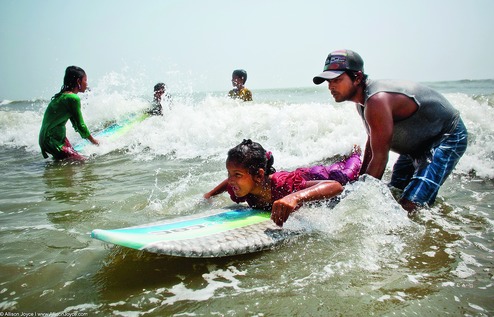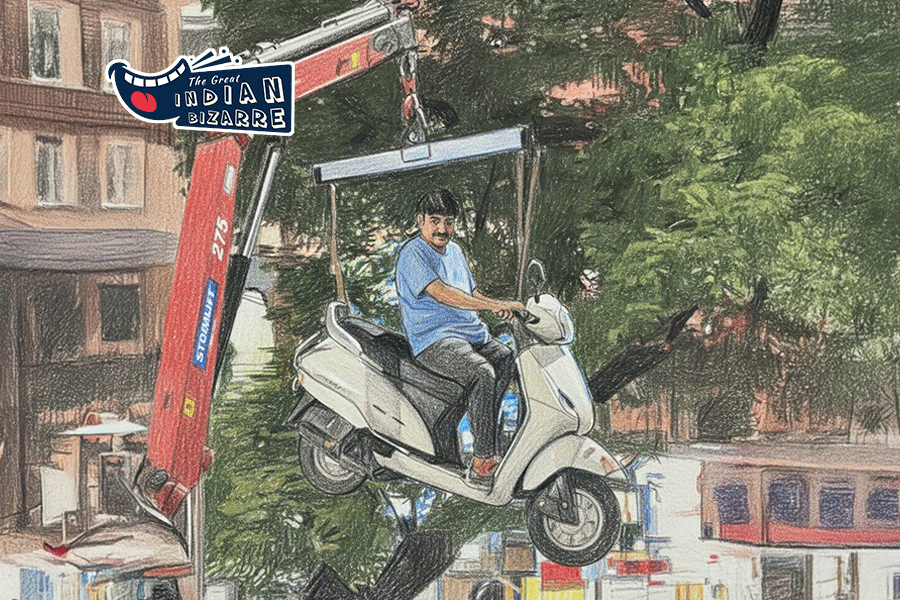

The waves are choppy as they usually are during the rains, but Rifa Akhtar knows how to ride them. She walks into the water wearing a swimsuit, her surfing board in hand, paddles out into the water for a bit and then slowly clambers onto the board. Within a few seconds, she is surfing atop the waters with élan.
"I love the rhythm of the waves," says the 13-year-old, a surfer at Cox's Bazar, a coastal town in Bangladesh. The fishing port is famed for its sandy stretch of over 100 kilometres, said to be the longest natural beach in world.
Until a few years ago, Rifa and her sister, Aisha, used to sell artificial jewellery and crisps on the beach. They made around 800 BDT (Rs 650) a day, while their father worked as a cook at a local shack. Life took a dramatic turn in 2013 when Rashed Alam - a surfer and lifeguard at Bangladesh Surf Girls and Boys, the sole surfing club for girls at Cox's Bazar - offered to teach them the sport.
"Rifa would look at us in awe," says Alam. "So one day, I asked her if she would like to learn to surf. Initially, she was shy, also intimidated by the waves. And she refused."
But Alam persisted, fanning the fire in her and helping build her confidence. In due time, their journey took off.
"A lot of time was spent paddling around and falling into the water. We were also asked to watch other surfers. There were days when I simply wanted to give up and leave," says Rifa, who won two surfing competitions at Cox's Bazar, in 2015 and 2016.
Rifa was among eight girls who joined Alam's club in 2013; now the number has risen to 14. Most of them hail from families of daily wage earners and hawkers in nearby villages, and were contributors to the family income.
Naturally, their path hasn't been an easy one. When they began surfing, Alam stopped them from working. Moreover, they did not tell their parents about their new activity, and when they came to know about it, all hell broke loose.
"The day Rifa's mother discovered her daughter had taken to surfing instead of selling trinkets, she beat her up with an umbrella in front of us all and dragged her away," Alam recalls. "Later, I went to her parents and explained that surfing is a popular sport and that there's no harm doing it."
Their question was - who will pay for the household expenses if she doesn't work?
Alam had no answer. For over a year, he paid a small amount of money to Rifa and the other girls for tea and snacks out of his own pocket. A year later, he started crowd-funding for them on the club's website. In this he was helped by his American wife, Venessa Rude, and a photojournalist friend, Allison Joyce. From the money that comes in, the club spends 5,000 BDT (Rs 3,950) on each girl.
"We provide the monthly grocery to each one's family. We've also enrolled them in school, while we help them with their English and communication skills privately. The girls are trained in rescue operations and first aid too. We hope this will help them become professional surfers and lifeguards," Alam says.
There were problems of another kind also. Many of Alam's close friends turned against him as they felt that by teaching the girls to surf, he was going against Islam. Also, when the male surfers in Cox's Bazar saw that the girls were doing very well, they began to threaten them and make their day difficult. Rifa and her friends were called "indecent" for moving around in swimsuits and taking up a sport which was hitherto an all-male domain.
"Initially, we took to the water in a salwar-kameez and orna (scarf). Later, Rashed bhai brought us swimsuits. The local people, however, objected to it," says Mayesha, 13, the daughter of a fish seller. Neighbours also taunted her parents for allowing her to surf along with the men. This forced them to start looking for a groom for her. "But I told them that I don't want to get married," says the determined girl.
Surfing has, in fact, helped Mayesha deal with difficult life situations. "Waves come in clusters or sets. Sometimes, the sea is still for a while and then suddenly a series of waves appears, rolling out one after the other. This has taught me to negotiate uncertainties," she smiles.
Mayesha's friend, Nargis Akhtar, too, refuses to be tied down with marriage right now. For this 14-year-old, the sea is her escape from all woes. "All my worries seem to get absorbed by this vast expanse. It also made me strong enough to take the tide in my stride; I can now fight against all odds," Nargis says happily.
Rifa, Mayesha, Nargis and the others have been taming the waves for about four years. Now they want to participate in an international surfing competition. A few months ago, they were ready to take on the Indian Open of Surfing at Sasihithlu Beach in Mangalore, but couldn't as their passports hadn't come in.
The chorus is clear - the girls want to see the world and surf the oceans. "I want to go to 'Caliponia' [California]," says Rifa, who now trains kid surfers at Cox's Bazar.
And Mayesha, who once dreamt that she was surfing in Indonesia, says, "I want to win global surfing competitions and make my country famous. And then everyone who created hurdles for us would shout out in cheer."











